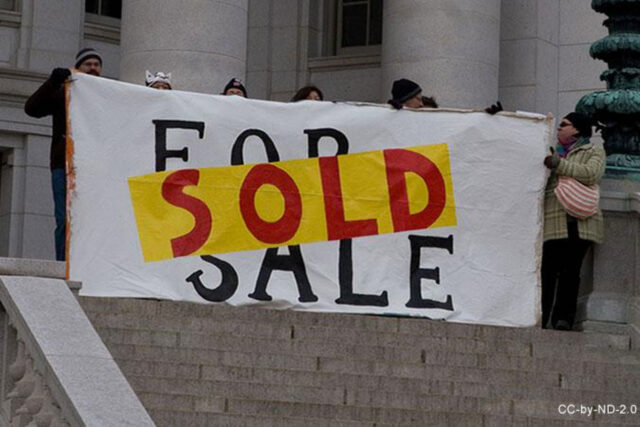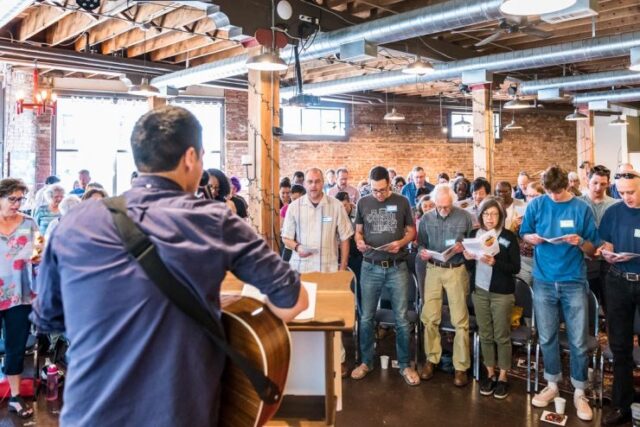The databases are carefully constructed by commercial organizations who go on to rent them out to promising candidates. Voter files have been around, in a less aggregated fashion, since at least the early 2000s. Obama’s 2008 campaign used one of the first databases called “VoteBuilder,” helping him dominate the contest that was the most expensive (at the time) presidential race in US history. In the early 2010s, one of the leading campaign compliance software companies shifted its focus towards leveraging its Democratic connections in providing voter data and web hosting services. NGP VAN was born through a merger of NGP Software and Voter Action Network, both of which had deep Democratic connections. While other services boast a history of over 50 years, NGP VAN is special because of its connection to the Democratic party, more of which will be discussed below.
Similar to the fundraising platforms, the company databases are usually bifurcated by party. The price of access is based on the invisible free market that strangles us all. One can assume, however, that as the cost of elections has risen, so too has the cost for voter files. L2 data, a prominent voter data company, advertised a rate of $.025/file in 2017. For the 3rd District of Wisconsin, that would mean one would have to raise about $18,000 before they were able to get access to data for everyone in the district—before they were able to roll it forward. And that is not to mention the additional files for individuals outside of the district, which is extraordinarily important since some studies indicate that 63% of House funding comes from outside of the district.
For the 3rd District of Wisconsin, that would mean one would have to raise about $18,000 before they were able to get access to data for everyone in the district—before they were able to roll it forward.
So I arranged a meeting with a prominent campaign data company. This was to account for the $650 monthly fee for access to their constituent relationship management (CRM) and federal disclosure program (more on this later). Access to their email services, which allows candidates to send mass emails and track the data associated with it, was an additional $315 per month. To manage fundraising events and growing lists was an additional $400-$500, depending on the level of service. In this conversation, the representative told me, rather pointedly, that I should not reach back out to them until I had already raised at least $10,000.
My mentor’s advice in this moment rang even more true. To be sure, in terms of political fundraising, this is not a significant amount. Even still, this arbitrary, corporate-controlled barrier to entering a political race in a meaningful way limits who might be a primary candidate and, ultimately, who might be serving in our country’s public offices. This threshold disfavors young people, who are unlikely to have the stockpile of capital required to roll fundraising forward; progressives, whose message is unlikely to appeal to wealthy/corporate donors; women, who have historically been less likely to be donated to (although this trend may have recently reversed); and individuals of minority groups, who are less likely to have money to contribute to candidates and less likely to receive contributions from white donors.
If all of this corporate gatekeeping to important voter data wasn’t enough, state political parties have an equally prominent role. State parties, including the Wisconsin Democratic Party, have amassed their own bank of data which they package through private companies to candidates. NGP VAN is especially prevalent in this domain because of its widespread use within Democratic campaigns.
Even still, this arbitrary, corporate-controlled barrier to entering a political race in a meaningful way limits who might be a primary candidate and, ultimately, who might be serving in our country’s public offices.
Like many, however, the company does not exist without controversy. During the 2016 Presidential primaries, the platform, under direction of the Democratic National Convention (DNC), generated criticism because of its actions towards the campaign of Bernie Sanders. A software glitch allowed the Sander’s campaign to access the records of Hillary Clinton’s team, which resulted in the accessing and saving of his opponent’s data. In response, NGP VAN revoked Sanders’ VAN access, claiming that it “was not to punish the Sanders campaign,” but only to correct the software issue.
Even if one is ambivalent on the motives behind this particular fiasco, political party control intersecting with corporate power in this manner is deeply problematic. One might be able to argue that party gatekeeping serves a valuable purpose instead of a nefarious one. They might argue that political parties serve the role of distancing authoritarians and appealing to the moderate side of the party. But over time, the parties have abdicated those responsibilities—with representatives Marjorie Taylor Greene as a prime example. Even without these examples, unchallenged political parties leverage monopoly power over the selection of candidates, creating a pool of political leaders that are increasingly pro-status-quo and indebted to the parties that deemed them worthy of support.
The Nature of Fundraising
Given my life circumstances (being in Boston and all), the lack of fundraising was the nail in my first campaign’s coffin. The experience, nevertheless, made me think about the nature of fundraising in general. In its current form, fundraising forces smaller candidates to be a marketer and cash-cow first and foremost. Larger campaigns—ones that involve a wealthy candidate or represent wealthy interests, on the other hand, can outsource fundraising to hired professionals.
While individual voters might be inundated with plea after plea to give whatever they can to, on average, a Democrat unlikely to deliver meaningful change to their life, business interests are pouring money into the campaigns of religious zealots and culture war instigators so that they will save money on their taxes.
In yet another way, having to solicit individual donations inherently favors conservative ideologies and the status-quo. While individual voters might be inundated with plea after plea to give whatever they can to, on average, a Democrat unlikely to deliver meaningful change to their life, business interests are pouring money into the campaigns of religious zealots and culture war instigators so that they will save money on their taxes. Those committed against taking PAC or SuperPAC money are further disadvantaged by the way our system is constructed, as they are forced to rely on single donors with lower maximum contribution limits and even more encumbered by the costs of buying data and hiring/recruiting volunteers to fundraise.
Although there are some high-profile cases of non-PAC candidates climbing the summit, if we were to reinvent the system that exists, one would be foolish to suggest that we would choose to construct it the same way. As they originated, SuperPACs were publicly viewed as anti-democratic. It is unlikely that their perception has changed dramatically since then.


![[F]law School Episode 2: Representation = Taxation](https://theflaw.org/wp-content/uploads/2024/07/Martinez_FB3-640x427.jpg)





